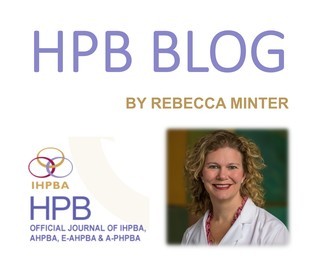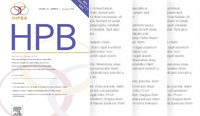International Hepato-Pancreato-Biliary Association
HPB Blog, May 2017

Critically Appraising our Impact and Outcomes in HPB Surgery
As HPB Surgery has evolved, surgical outcomes have significantly improved and rigorous assessment of our surgical performance has led to better and safer care for patients. This honest evaluation of our current practice allows for the implementation of innovation in a thoughtful manner, while protecting patients from harm. In the current issue of HPB, several authors critically evaluate both emerging surgical techniques and approaches for the treatment of recalcitrant HPB malignancies, as well as examine how well we are doing in managing populations of patients with HPB surgical disease.
This month’s issue opens with a leader triggered by a case control series evaluating the application of ALPPS to patients with peri-hilar cholangiocarcinoma, drawing from the international ALPPS registry experience. The discourse which was spurred by these pieces, culminating in a response from the authors at the conclusion of the issue, represents an excellent example of the importance of open dialogue and critical assessment of outcomes which accompany the implementation of a new complex surgical technique. Similarly, colleagues evaluate and report the outcomes for two-stage hepatectomy for the treatment of colorectal liver metastases from the LiverMetSurvey registry, drawing from the prospectively reported experience across multiple countries. Two additional papers from the Netherlands highlight the evaluation of not only surgical outcomes following regionalization of care for patients with pancreatic cancer, such as the impact of pancreatic fistula and associated cost of management, but also the impact of socioeconomic status on the treatment of patients with pancreatic cancer within a country. Assuming all patients are truly captured in these registries, these initiatives will allow us to answer important clinical questions where randomized control trials are not possible, and to evaluate additional important questions like equitable access to care for a population of patients.
In addition to prospectively evaluating our outcomes across multiple centers, HPB surgeons are also engaging in research focused on the identification of better biomarkers or clinical criteria which can lead to better patient selection for surgery. Given the morbidity of the operations we perform, and the lethality of the cancers that we treat, careful selection of patients most likely to benefit from surgery is of critical importance. Two papers in this month’s issue of HPB highlight the potential application of novel markers which may provide important prognostic information for patients undergoing treatment for pancreatic cancer and hepatocellular carcinoma. Though retrospective in nature, they provide interesting data to support future prospective studies.
Two additional studies this month, present decision-making tools which may guide surgeons in a more tailored approach to their surgical planning using clinical criteria available pre-operatively. Onoe et al present a pre-operative predictive score system which appears to outperform the Tokyo guidelines in predicting which patients are unlikely to have a critical view of safety achieved in the setting of acute cholecystitis. This nomogram could potentially lead to increased awareness regarding the potential for a difficult dissection, and decision to perform a subtotal cholecystectomy earlier; thus possibly reducing the incidence of major biliary injury. Kim et al also report on the development of a nomogram for predicting which patients are likely to benefit from salvage surgical therapy following post-operative extrahepatic recurrence of cholangiocarcinoma. These nomograms will require further evaluation prospectively using a validation dataset, but certainly provide tools which may aid the HPB surgeon in their future decision-making.
Read all of these articles and more in the May Issue of HPB!
Corporate Partners
If you are interested in becoming a Corporate Partner of the IHBPA please contact industry@ihpba.org
Find out more


